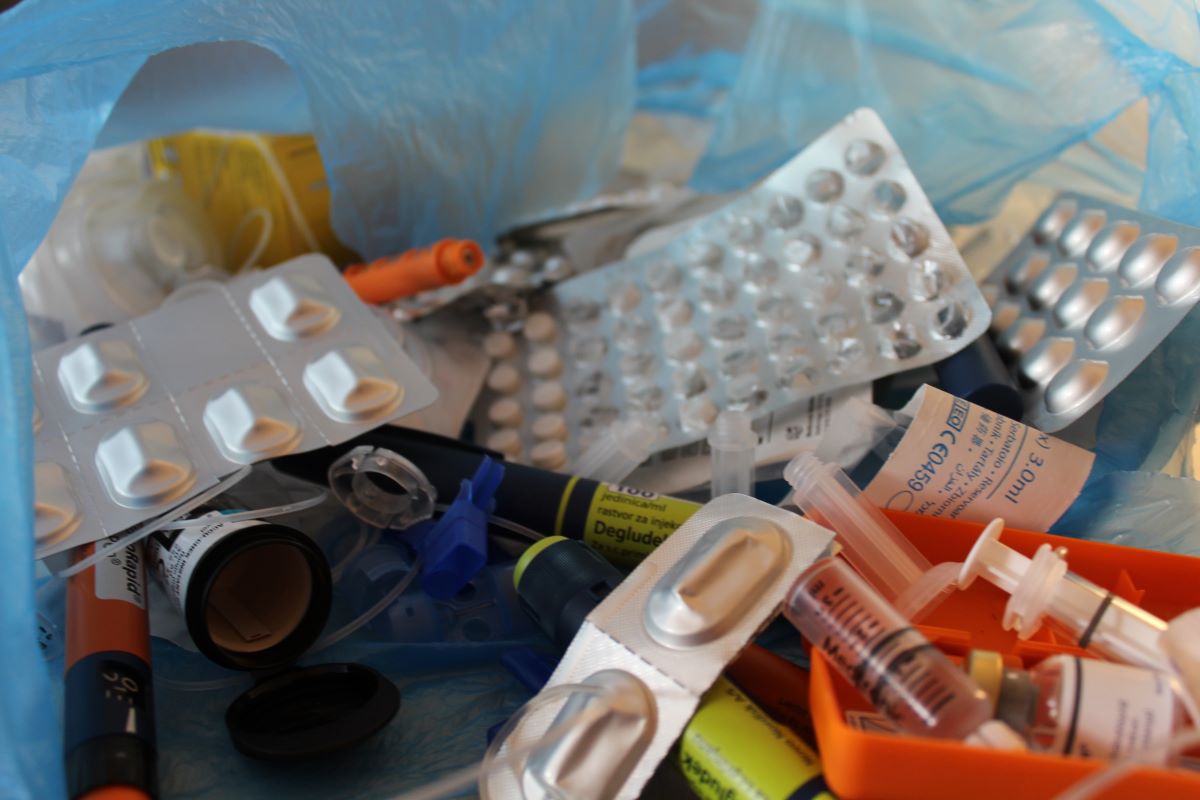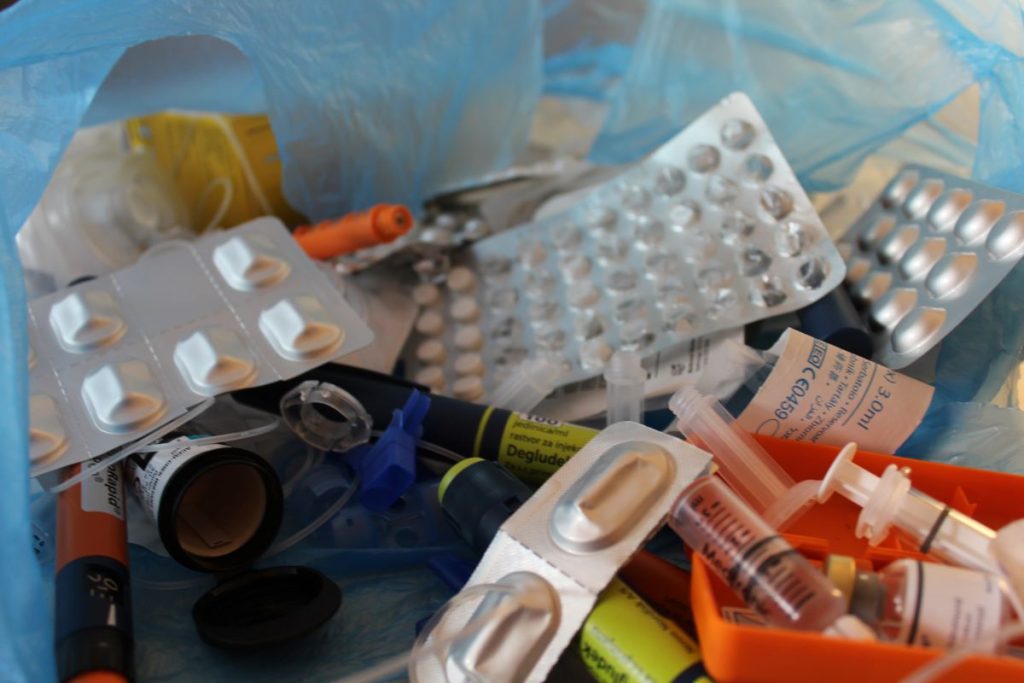SARAJEVO – Disposal of medical waste from households is not regulated by the laws in Bosnia and Herzegovina (BiH), and the institutions do not monitor waste quantities and the methods of its disposal. Inadequate disposal of this waste poses a risks to the health of citizens.

“Never dispose of your medicines into waste waters or household waste, ask your doctor or pharmacists about how to dispose of medicines you no longer use”, such warnings are found in the instructions for medicines we use every day, with an explanation that these measures will help preserve the environment.
If you contact a doctor or pharmacist in Bosnia and Herzegovina with this question, the chances are slim that you will get an answer that will prevent this waste ending up in the environment.
“Flush them down or throw them to the garbage bin, like all of us”, was the answer in a pharmacy when we attempted to return unused antibiotics.
However, there are exceptions, where some pharmacies, although not legally obligated, collect this waste and dispose of it at their own expense.
The legal provisions also set forth that the waste is disposed of in a way that will not put at risk life and health of people, and without any risk to soil, air, animals and plants.
Due to non-existence of clear legal provisions and disposal system, medical or pharmaceutical waste from the households usually ends up with the municipal waste, which is further disposed to sanitary landfills, but also to uncontrolled (illegal) landfills. This type of disposal is the cheapest way to dispose of the waste, but its negative impact on the air, ground and surface waters, soil and ultimately on people and animals potentially brings around some very expensive consequences.
“Release of pharmaceutical waste into the environment, especially into waters, can results with its introduction into the food chain, and therefore it is necessary to observe strict criteria for records and surveillance, from the place of origin of all types of medical waste to the place of its final disposal”, said for Tačno.net dr. Aida Vilić-Švraka, specialist of hygiene and health ecology, from the Public Health Institute of the Federation of BiH (PHI FBiH).

However, the institutions in BiH do not have information about how much of this type of waste is produced and disposed of by the healthcare institutions, nor do they have any estimates of how much is generated by the households.
The regulations define pharmaceutical waste as medical waste that includes medicines, medical devices, which have become unusable due to the expiration of shell life, wastage and are unused, including the packing
The waste in BiH is measured in millions of tons per year, but the institutions have no information about the amounts of specific waste. Collected hazardous pharmaceutical waste should, as a rule, be exported and disposed of in the incinerators of the EU countries, because there are no conditions for its disposal in the country.
But, the information we have come by show that several tons of this waste were imported into BiH.
Waste disposal is left to the consciousness and conscience of the individuals
According to the data of the BiH Statistics Agency each citizen in BiH annually produces on average 350 kg of municipal waste. Most of the waste collected from the households is mixed waste, including pharmaceutical waste.
In addition to medicines that have expired or are not used for any other reasons, large amounts of waste are generated by people with chronic diseases such as diabetes. These patients weekly produce large amounts of waste in the form of needles, insulin pens, sets, reservoirs, lancets, blood sugar measuring strips, etc.
This type of waste is collected from private and public healthcare institutions by operators who have approval and an environmental permit for waste collection and disposal. There is no organized collection for the same type of household waste.
“Unfortunately, this waste mostly ends up with ordinary municipal waste in the city garbage containers”, said Alen Nogić, head of the department for medical waste management in the company “Aida Commerce”
This is confirmed by the citizens whom we have surveyed for the purpose of this text. A total of 14 out of 23 respondents said that they throw this waste to the garbage bin together with other waste, because, as they said, no one told them to do it differently.
Five respondents said that they take the waste to the pharmacy, and four said that they do not have this type of waste.

You will get different answers and experience concerning collection of this waste depending on the pharmacy you visit: that they don’t collect waste at all; that they take the patients’ phone number as to call them to bring the waste when the operator collects it from the pharmacy; that they advise the patients that waste should be collected by the pharmacy that issued the medicine; that they do not collect the waste because they cannot have surpluses because of the inspection and then there are pharmacies that regularly collect such waste from the patients. It is even possible to get different answers from pharmacies belonging to the same chain of pharmacies.
The pharmacies are not legally obligated to collect waste from the citizens, and the collection itself represent additional costs and work because they must keep a detailed record of collected waste.
“We now must pay for disposal of waste for destruction ourselves, but I simply do not know how to do it in any other way”, explained Adisa Džananović, member of the Board of Directors of the FBiH Chamber of Masters of Pharmacy, who said that her pharmacies in Sarajevo and Goražde are regularly collecting this waste from the patients.
There is a criterion in the Safety and Quality Standards for Pharmacies of the FBiH Agency for Quality and Accreditation in Healthcare (AKAZ) that enables the collection of expired medicines from patients, but there is no obligation to do so. While the Standards for the Certification of Pharmacies of Republika Srpska (RS) read that “the pharmacy ensures proper disposal of pharmaceutical waste, including pharmaceutical waste brought from households to the pharmacy by the patients”. The standards also read that it is necessary to have an appropriately marked container for collecting pharmaceutical waste from households in a visible place.
Although this obligation exists for the certification of pharmacies, the RS Administration for Inspection Affairs said for Tačno.net that it is not applied in practice, because the issue has not been fully addressed by the law. It is not effectively defined who will bear the costs of collection and final disposal of waste from the households.
“The biggest risk currently is the disposal of pharmaceutical waste generated in the households”, said the Inspectorate.
Uncontrolled disposal to landfills
Apart from sporadic cases of collection of pharmaceutical waste from citizens, the only and the cheapest possibility is disposal to landfills, which are mostly at inappropriate locations and technically unequipped.
“Disposal of all types of unprocessed medical waste to the landfills, and particularly those that are not controlled, poses a risk to the environment and human health, and therefore this type of waste needs to be reduced as much as possible”, said dr. Aida Vilić Švraka.
She recommended to the citizens to donate unexpired medicines to the healthcare institutions or to other patients who use them. She underlines the importance of preventive measures when disposing of medical waste: sharp items, such as needles and lancets, have to be closed in a solid container after the use, and other waste such as bandages, compresses and masks have to be sprayed with disinfectant and put in a thicker bag that must be tied tightly and then dispose of with other municipal waste.
“This is the way to prevent dissipation of the waste, and therefore the possibility for the spread of disease causing agents in the environment and to other people”, explained dr. Vilić Švraka.
The report about the state and activities of “Smiljevići” landfill that the Ministry of spatial planning, construction and environmental protection of Canton Sarajevo prepared in 2019 reads that the use permit for this sanitary landfill allows the disposal of municipal waste only. However, as it reads, different types of waste have been disposed to this landfill since the beginning.
The cantonal utility company “Rad” that manages this landfill say that they have no data on how much medical/pharmaceutical waste from the households ends up in the landfill.
Foto: poslovnenovine.ba
Mirza Ramić, from “Rad”, said that this area primarily must be regulated by law, and that the best solution would be to return the medical waste to the healthcare institutions or pharmacies that have issued certain medicines or medical devices
“The bottom line being that this should be precisely defined by a national law where you would be forced, whether you like it or not, to collect that waste if you have issued it”, explained Ramić
Federation pharmaceutical inspection and RS health inspection said for Tačno.net that healthcare institutions and pharmacies, and not the citizens, are actually in focus of their work.
Entity laws specify pecuniary fines for inappropriate waste disposal and treatment. A prison sentence of three months up to three years is prescribed in Federation of BiH for anyone who collects, treats, stores, transports and disposes of waste without permission and thus causes danger to the life and health of people and the environment.
Entity inspections have neither observed major irregularities nor imposed sanctions related to the disposal of pharmaceutical waste in recent years.
The RS inspection said that the last reported case took place in March of 2019, when a landfill of medicines was observed in the forest area of Mrkonjić-Grad. “The expiration dates that were visible referred to the period from 1993 to 1997, and it was not possible to determine who disposed of that waste and when. The competent authorities took the necessary measures and the waste was removed,” said the RS Inspection.
According to the data of the FBiH PHI there are around 2.000 uncontrolled (illegal) landfills documented in this entity alone, and the exact number is not known because new landfills take place of the rehabilitated ones on a daily basis. According to the data, 55 odsto of potentially infectious, 23 odsto of chemical and 20 odsto of pharmaceutical waste from the healthcare institutions is disposed to the landfills together with the municipal waste.
Management of medical waste from healthcare institutions
Hazardous pharmaceutical waste from healthcare institutions is, as a rule, handed over to the operators who should be exporting it to Austria, Italy or Germany where it is destroyed under strictly controlled conditions.
The FBiH PHI states that there is a certain number of medical incinerators in BiH, but that they do not meet the requirements of the European Union because their burning temperature is not high enough and they do not have waste gas emission control.
In the absence of data on the production and disposal of this waste, both in households and in healthcare institutions, institutions cannot monitor how much of this waste is properly destroyed.
The data of the Indirect Taxation Authority of BiH (ITA) show that 128.418 kilograms of pharmaceutical waste, worth BAM 3.493, was exported last year. Similar amounts were exported in previous years, while slightly less – 64.355 kg was exported in 2020 at time of Corona virus pandemic, when the amount of medical waste was higher.
The data of the Indirect Taxation Authority of BiH
The company “Aida Commerce”, which is one of the operators collecting medical waste from the healthcare institutions, states that they are focused on infectious and potentially infectious waste, since they dispose of it themselves. They dispose of infectious waste and sharp items by way of disinfection and shredding, thus turning it into the regular municipal waste.
They collect pharmaceutical and other medical waste that needs to be exported, but due to the costs of incinerators, it is not, as they say, in their financial focus.
They explain that it is expensive for healthcare institutions to collect and dispose of waste. The price of infectious waste per kilogram is from four to ten marks. This company collects seven to eight tons of infectious waste per month.
“I can only tell you that, unfortunately, 70% of that infectious waste in Bosnia and Herzegovina ends up among municipal waste, because adequate collection is not done at the place of origin. Healthcare institutions, unfortunately, hand over smaller quantities than they genuinely have. Why is that? Due to financial inability”, explained Alen Nogić from the company “Aida Commerce”.
The FBiH PHI raises concerns that the disposal of medical waste is becoming a big problem for all healthcare institutions, due to the increase in its quantity, which especially applies to infectious and potentially infectious waste, which also increases the risk of the spread of infectious diseases and poisoning.
As Nogić says, the waste they export to the incinerators mostly goes to Austria. Considering that the amount of this waste is smaller than the amount of infectious waste, they export it in cooperation with other companies operating in this area.
In addition to “Aida Commerce”, as he states, this work is done by four other companies in BiH – “Reciklon”, “Kemeko”, “MVVM” Mostar and “Eco Group” Banja Luka.
Although BiH does not have the conditions for the disposal of this type of waste, data from the ITA show that 5.800 kg of this waste was imported in 2022 at a value of BAM 4.516.
Even though we have sent an inquiry to the ITA it did not provide information on who are the biggest exporters and who imported this waste. Tačno.net


